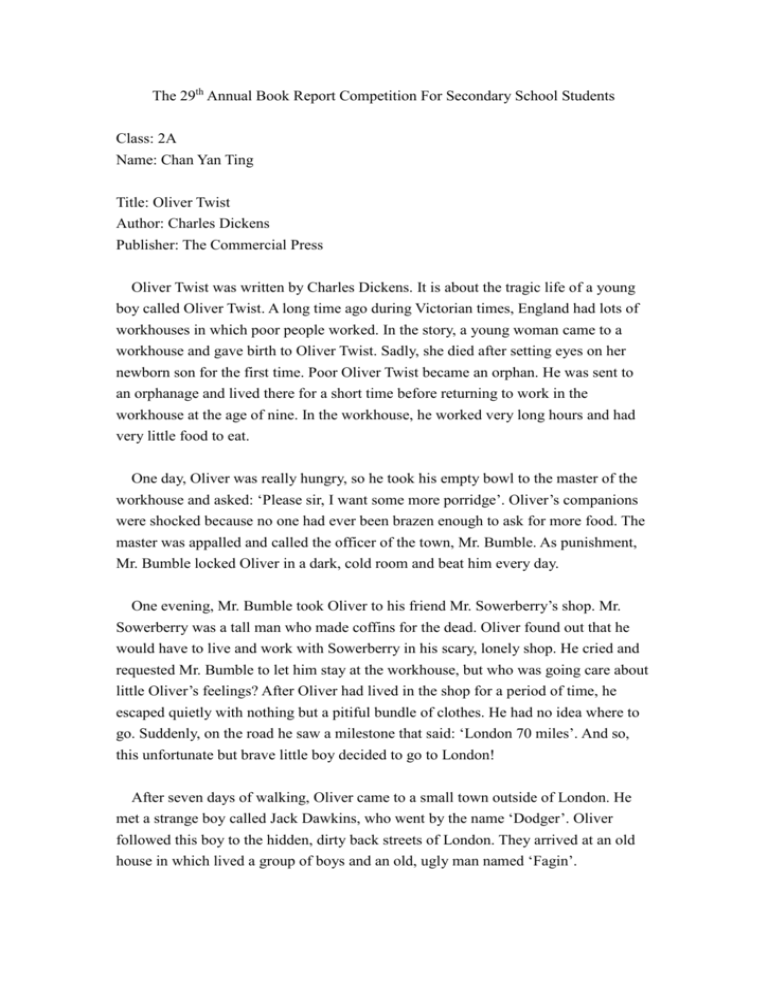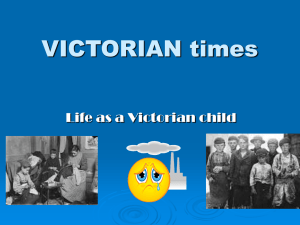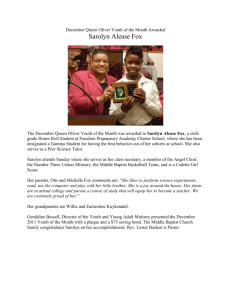Book report
advertisement

The 29th Annual Book Report Competition For Secondary School Students Class: 2A Name: Chan Yan Ting Title: Oliver Twist Author: Charles Dickens Publisher: The Commercial Press Oliver Twist was written by Charles Dickens. It is about the tragic life of a young boy called Oliver Twist. A long time ago during Victorian times, England had lots of workhouses in which poor people worked. In the story, a young woman came to a workhouse and gave birth to Oliver Twist. Sadly, she died after setting eyes on her newborn son for the first time. Poor Oliver Twist became an orphan. He was sent to an orphanage and lived there for a short time before returning to work in the workhouse at the age of nine. In the workhouse, he worked very long hours and had very little food to eat. One day, Oliver was really hungry, so he took his empty bowl to the master of the workhouse and asked: ‘Please sir, I want some more porridge’. Oliver’s companions were shocked because no one had ever been brazen enough to ask for more food. The master was appalled and called the officer of the town, Mr. Bumble. As punishment, Mr. Bumble locked Oliver in a dark, cold room and beat him every day. One evening, Mr. Bumble took Oliver to his friend Mr. Sowerberry’s shop. Mr. Sowerberry was a tall man who made coffins for the dead. Oliver found out that he would have to live and work with Sowerberry in his scary, lonely shop. He cried and requested Mr. Bumble to let him stay at the workhouse, but who was going care about little Oliver’s feelings? After Oliver had lived in the shop for a period of time, he escaped quietly with nothing but a pitiful bundle of clothes. He had no idea where to go. Suddenly, on the road he saw a milestone that said: ‘London 70 miles’. And so, this unfortunate but brave little boy decided to go to London! After seven days of walking, Oliver came to a small town outside of London. He met a strange boy called Jack Dawkins, who went by the name ‘Dodger’. Oliver followed this boy to the hidden, dirty back streets of London. They arrived at an old house in which lived a group of boys and an old, ugly man named ‘Fagin’. The next morning, Oliver watched as Fagin instructed the boys in the art of pick-pocketing. Later, he went with the boys to a noisy, bustling part of London town. Suddenly, one of the young boys stole a handkerchief from a man’s pocket. The next moment, the man shouted ‘Thief!’ and the boys all ran away, except Oliver. In shock, Oliver realized he was working with thieves! He was caught by the police, but before they led him away, a kindly old man, Mr. Brownlow, explained to the police that Oliver was innocent. In the course of time, Mr. Brownlow adopted Oliver. Oliver was very happy to live with Mr. Browlow and his housekeeper. However, another thief and associate of Fagin’s , Bill Sikes, heard about what had happened. He was afraid that Oliver would tell the police, so he decided to catch Oliver. It seemed that poor Oliver’s life would never be safe or stable. Oliver had to hide from the gang of thieves. During this time he found out that he had a half brother called ‘Monks’. For an orphan, it was good news. However, his half brother was envious of Oliver because he didn’t want to share the inheritance money left by their father. Monks decided to betray Oliver and have him put in prison. However, with the help of his new-found friends, Oliver was saved from these nasty men. In the end, the bad men were defeated, and Oliver’s inheritance was returned to him. He lived happily ever after with his new family. In this story, we meet a lot of criminals and other horrible people. However, we also see a lot of kind and helpful people. They help Oliver to solve many problems. Without their support, Oliver Twist would surely have been murdered or spent a lifetime in prison. This story is an example of the redeeming qualities of kindness and compassion. Characters such as Mr. Brownlow are a good example of this. Oliver was a brave boy. He could overcome many difficulties. Sometimes hardship and failure make us want to give up, so we should always remind ourselves that: ‘nothing is impossible’.







